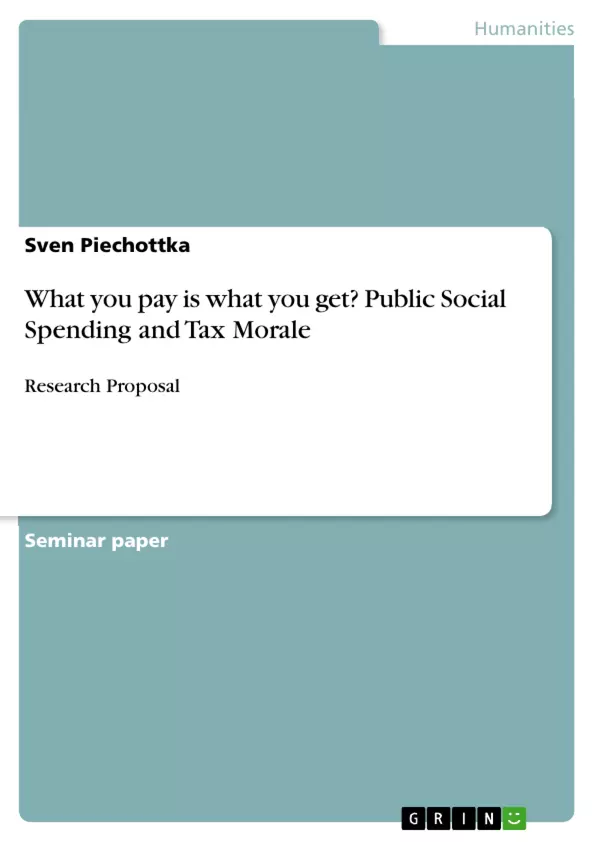In this short paper I will develop a conceptual proposal to explore the relationship between public social spending (PSS) and tax morale. The latter has experienced more and more interest among scholars in the past several decades in order to clarify the “puzzle of tax compliance”, which is to explain, why tax compliance turns out to be substantially higher than the neo-classical model would estimate. Since research has provided empirical evidence for the impact of tax morale on tax compliance, scientists are faced with the challenge to come up with determinants of tax morale. This paper suggests public social spending as a determinant. On the basis of the existing research literature, I set up a research hypothesis, which shall to be tested in the context of three selected countries. A research concept is described while possible limitations are taken into account. These considerations as well as potential promises of the concept are summed up in the conclusion.
Inhaltsverzeichnis (Table of Contents)
- Literature Review and Research Question
- Research Structure
- Case Study Selection
- Methods
- Limitations
- Conclusion
Zielsetzung und Themenschwerpunkte (Objectives and Key Themes)
This research proposal aims to investigate the relationship between public social spending and tax morale, a concept that has gained significant attention in recent decades to explain the "puzzle of tax compliance". It explores whether individuals' willingness to pay taxes is influenced by the level of public social spending and the perceived fairness of the state's social programs. The paper seeks to test a research hypothesis through a case study approach, considering potential limitations and the implications for political decision-making.
- The impact of public social spending on individual tax morale.
- The relationship between tax morale and tax compliance.
- Determinants of tax morale, such as socio-demographic factors, trust in the state, religious beliefs, and social norms.
- The role of individual perceptions of fairness and the principle of exchange equity in shaping tax morale.
- The potential for influencing tax compliance through policies that affect tax morale.
Zusammenfassung der Kapitel (Chapter Summaries)
- Literature Review and Research Question: This chapter provides a comprehensive review of existing literature on tax morale and tax compliance. It examines various theoretical frameworks, including the altruistic perspective, the moral approach, and the concept of reputation costs. The chapter also explores existing research on factors influencing tax morale, such as socio-demographic factors, trust in the state, religious beliefs, and social norms. It concludes by formulating the research question: Is there a relationship between the scope of public social spending and individual tax morale?
- Research Structure: This chapter outlines the research structure, including the case study selection, methods employed, and potential limitations. It discusses the challenges associated with measuring and comparing tax morale across different countries and the need to account for various cultural and institutional factors.
Schlüsselwörter (Keywords)
The key focus of this research proposal is on the relationship between public social spending and tax morale. It explores factors such as tax compliance, tax evasion, fairness perceptions, the principle of exchange equity, socio-demographic factors, trust in the state, and the impact of religious beliefs and social norms on tax morale.
Frequently Asked Questions
What is the relationship between public social spending and tax morale?
The paper investigates whether higher public social spending increases individuals' willingness to pay taxes based on the principle of exchange equity and perceived fairness.
What is the "puzzle of tax compliance"?
It refers to the observation that people pay more taxes than neoclassical economic models (based solely on deterrence and audits) would predict, suggesting internal motivations like tax morale.
What are the main determinants of tax morale identified in the literature?
Determinants include socio-demographic factors, trust in the state, religious beliefs, social norms, and the perceived quality of public services.
How does "exchange equity" influence tax morale?
Taxpayers are more likely to comply if they feel they receive a fair return for their taxes in the form of social security, infrastructure, and other public goods.
What methodology is proposed to test the research hypothesis?
The paper suggests a comparative case study approach involving three selected countries to analyze the impact of different spending levels on individual tax morale.
- Arbeit zitieren
- Sven Piechottka (Autor:in), 2016, What you pay is what you get? Public Social Spending and Tax Morale, München, GRIN Verlag, https://www.grin.com/document/372000



